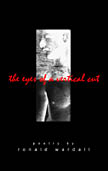
|
The Eyes of a Vertical Cut |
| R o n a l d W a r d a l l | |
|
Home Page New Releases Annual Chapbook Contest Back Issues Video |
|
 |
What (Wardall) does so well is to restore the past of his childhood and of a time and place in America—but what often is so singular about these poems, is the edgy marriage of very private moments with nature, music, and sex. He brings his powers of reflective and historical intelligence and imaginative daring to a beautiful fruition again and again.
—Jason Shinder
The Eyes of a Vertical Cut Copyright 2001 by Ronald Wardall |
 photo by Ed Druck
photo by Ed Druck